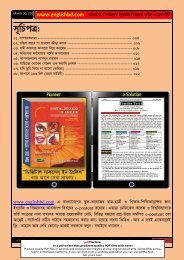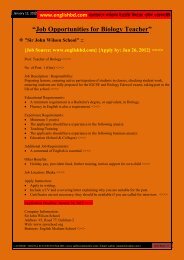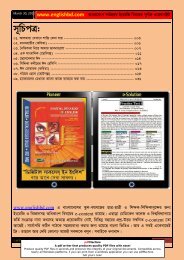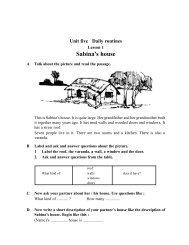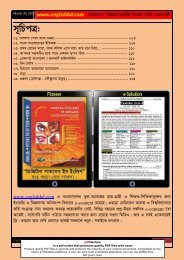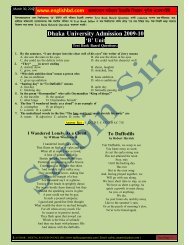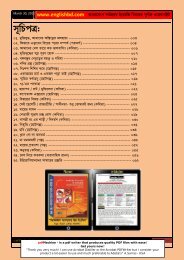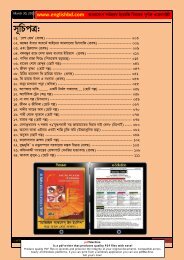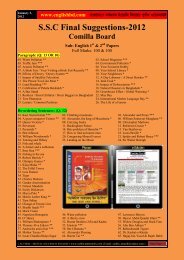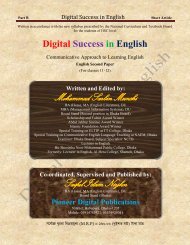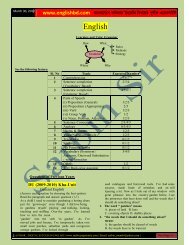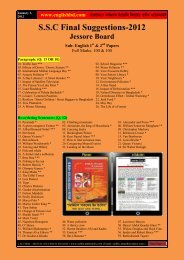Tag Questions - englishbd.com
Tag Questions - englishbd.com
Tag Questions - englishbd.com
You also want an ePaper? Increase the reach of your titles
YUMPU automatically turns print PDFs into web optimized ePapers that Google loves.
Part A Digital Success in English <strong>Tag</strong> <strong>Questions</strong><strong>Tag</strong> <strong>Questions</strong>Question No. 7; Marks 5wKQy K_v:- Bs‡iwR fvlvq cÖwZ‡hvwMZvg~jK cixvq tag question-Gi Dci wKQy cÖkœ †`Iqv n‡q _v‡K| A‡b‡KB tag question-†K mnR I MZvbyMwZK g‡b K‡i AeÁv K‡ib| g~jZt tag question-Gi Dci intensive usages-mn mwVK Ávb bv _vK‡j mwVKDËi ‡`Iqv hvq bv| wkÿv_©x‡`i myweav‡_© cÖ_‡g general usages Ges c‡i intensive usages †`Lv‡bv n‡q‡Q| ZvQvov, cÖwZwUintensive rule-Gi †ÿ‡Î D`vni‡Yi c‡i analysis ev we‡kølY _vKvq wkÿv_©x‡`i wbqg¸‡jv eyS‡Z myweav n‡e| cÖ`Ë wbqg¸‡jvAvq‡Ë¡ Avbvi ci wkv_©xMY tag question m¤ú‡K© mg¨K aviYv †c‡Z mg n‡e|<strong>Tag</strong> Question ˆZwiKiY:- e³v (speaker) †Kvb NUbv (statement) eY©bv Kivi ci D³ NUbvi mZ¨Zv hvPvB Ki‡Z tagquestion e¨envi K‡i _v‡Kb| mvaviYZ GKwU sentence-Gi †k‡l Kgv (,) e¨envi K‡i Zvici tag question Ry‡o †`Iqv nq|Auxiliary verb w`‡qB mvaviYZ tag question •Zwi Ki‡Z nq|Rules of General Usages of <strong>Tag</strong> Question:- wb‡gœ tag question •Zwii wbqg-Kvbyb D`vniYmn †`Iqv n‡jvt-(i) cÖ`Ë sentence-Gi g‡a¨ auxiliary verb _vK‡j D³ auxiliary verb w`‡qB tag question Ki‡Z n‡e| Avi auxiliaryverb bv _vK‡j †m‡‡Î cÖ‡qvRbvbyhvqx do, does ev did e¨envi Ki‡Z n‡e|(ii) cÖ`Ë sentence-wU affirmative n‡j tag question Ki‡Z n‡e negative w`‡q Ges cÖ`Ë sentence-wU negative n‡j tagquestion Ki‡Z n‡e affirmative w`‡q|(iii) tag question Kivi mgq tense NwUZ †Kvb cwieZ©b Kiv hv‡e bv|(iv) cÖ`Ë sentence-wUi subject Abymv‡i tag question-Gi subject A_©vr pronoun e¨envi Ki‡Z n‡e|(v) <strong>Tag</strong> question-Gi AskUzKz hLb negative nq ZLb mvaviYZ contracted form (‡hgb- don‟t, *ain‟t, can‟t, doesn‟t,didn‟t, shan‟t, shouldn‟t, hasn‟t, hadn‟t, won‟t BZ¨vw`) e¨envi Kiv nq|(vi) Imperative sentence Øviv cÖ¯Íve (proposal) eySv‡j tag Kivi mgq shall we e¨envi Ki‡Z nq; Zv bvn‡j will youwKsev won‟t you w`‡q tag Ki‡Z nq| Z‡e †ÿÎwe‡k‡l can you/can‟t you/shouldn‟t you/could you BZ¨vw` e¨enviK‡iI tag Kiv hvq|(vii) Exclamatory sentence-Gi †ÿ‡Î sentence-wU‡K g‡b g‡b assertive K‡i †mB Abymv‡i tag Ki‡Z nq|cÖ`Ë g~j Sentence Kgv <strong>Tag</strong> Question cÖkœ‡evaK wPýAffirmative Sentence (+) , Negative <strong>Tag</strong> (-) ?Negative Sentence (-) , Affirmative <strong>Tag</strong> (+) ?(viii) British English Ges American English-Gi cv_©‡K¨i Kvi‡Y ‡Îwe‡k‡l tag question wfbœ iKg n‡Z cv‡i| †hgb-They have three children, haven‟t they? (According to British English)They have three children, don‟t they? (According to American English)The girl has not a pen, has she? (According to British English)The girl has not a pen, does she? (According to American English)*ain‟t kãwU c~e©-cÖPwjZ Bs‡iwR‡Z ‡ewk e¨eüZ n‡Zv| Z‡e AvaywbK Bs‡iwR‡ZI non-standard Ges colloquial English (K_¨Bs‡iwR) wnmv‡e am not, is not, are not, have not, has not BZ¨vw`i contracted form iƒ‡c GB ain‟t kãwU e¨eüZ nq|AvaywbK standard Bs‡iwR‡Z ain‟t e¨envi bv KivB †kªq|Examples of General Usages of <strong>Tag</strong> Question:-(i) She has done the work, hasn‟t she?(ii) Della bargained with the shopkeepers, didn‟t she?(iii) Never eat more than one thing for luncheon, will you?




